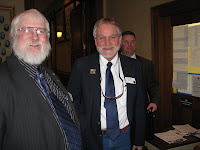
Senate passes Workers Comp bill
Rejects unfriendly amendments, then passes bill unanimously, 30-0
Acknowledging that Wyoming’s injured workers deserve better treatment, the Wyoming Senate Monday passed a bill improving death benefits to surviving family members and extending and increasing temporary total and permanent total disability benefits.
The Senate passed the bill unanimously, 30-0. The House similarly approved the bill on a unanimous 60-0 vote.
Injured workers, the AFL-CIO, the Wyoming Trial Lawyers Association, the ESPC worked for nearly 18 months to bring the need to improve the care extended to people hurt on the job to the public’s attention. (That's a photo of Les Vasey of the Laborers' local and AFL-CIO Executive Secretary Kim Floyd, above.)
The advocates’ mantra was short:
“No one should go broke because they went to work one day and got hurt.”
The Joint Labor, Health and Social Services Committee took the question up during last year’s interim between legislative sessions. The committee conducted several hearings, then hammered out legislation that will make things better for people aimed at changing the state’s treatment of injured worker
In Monday’s action, the senate rejected two deleterious amendments; one proposed by Sen. Charles Scott and a second proposed by Sen. Drew Perkins. Both senators represent districts that include parts of Casper.
Scott proposed an amendment that would have rejected part of the bill that requires the Workers’ Compensation division to pay its fair share of litigation costs when it claims up to 33% of the settlements won in successful third-party lawsuits filed by injured workers.
The Perkins amendment would have reduced the age limit under which children of workers killed at work are eligible for survivor benefits.
Neither amendment garnered much support. Each was defeated on a voice vote. (Once again, here is the need for taking roll call votes on amendments. In the official record, there’s no telling who supported and who opposed the suggested changes.)
In its consideration of the House bill, the Senate added several amendments:
- Allows injured workers seeking vocation rehabilitation to attend a private technical school as well as a community college or UW.
- Allows workers’ comp coverage of single proprietorships with just one employee.
- Changes the appropriation to set aside $100,000 for a single new position in the Office of Adminstrative Hearings* rather than $200,000 for two positions. Appropriates $50,000 for a study of OAH procedures aimed at making it technologically current. The amendment also requires the Worker’s Comp division and DOT to split those costs 55% - 45%.
House Bill 54 Workers’ compensation amendments will:
- Increase dependent children’s, death and permanent impairment benefits;
- Provide a minimum and extend the duration of temporary total disability benefit;
- Provide an annual cost of living adjustment to permanent total disability benefits;
- Extend the maximum duration of vocational rehabilitation benefits;
- Extend the period over which death benefits are paid;
- Limit the time for the Workers’ Compensation Division to recover overpayments;
- Revise the criteria for, and distribution of, employer premium credits;
- Authorize companies with as few as two employees to obtain coverage under the system;
- Require the state to pay a fair share of the costs of litigation when covered workers recover damages from third parties;
- Require the division to reconsider claims if an injured worker’s failure to meet a procedural deadline is the fault of the worker’s attorney;
- Authorize and appropriate $100,000 for one additional position in the Office of Administrative Hearings and $50,000 for the cost of investigating the acquisition of a case management system capable of accepting and receiving electronic filings and which includes a time management system.
Also, here's a thanks to all the journalists who wrote about this issue, but a special thank-you to Dustin Bleizeffer of the Casper Star-Tribune. Reporter Bleizeffer demonstrated great devotion to workers and the state that needs them by writing many stories about the system and its flaws.
Campaign contributions reined in …
The House Monday amended Senate File 12, the proposed bill to increase the limit on campaign contributions from individuals from $1,000 per election (the primary and general count as separate elections) to $2,400 per election, the same as the federal individual contribution limit.
The amendment applied the increased limit only to statewide races (governor, secretary of state, auditor, treasurer, and state superintendent of public instruction), not to legislative or local races.
The amendment, sponsored by Rep. Mary Throne (Democrat from Cheyenne) and co-sponsored by Rep. Amy Edmonds (Republican from Cheyenne), focused the argument that campaign contribution limits should bear some relationship to the cost of races.
Contributions at the $2400 level are not necessary for legislative and local races, they argued, and it’s better for candidates to have to appeal to a larger group of people for the funds they need to campaign.
The principal argument against the amendment (and for the bill) seems to be “inflation.” It seems odd that some legislators are very concerned about inflation cutting into campaign contribution levels, but not other amounts set in statute – like minimum wage for tipped employees, for example.
Senate File 12 is on third reading and final passage Tuesday morning. Please contact your legislators and ask them to keep the amendment and, if it is removed on third reading, to oppose the bill.
Helium property tax goes to Gov. Dave
Also on Monday, the HB 287 Helium - property tax won final approval when the Senate adopted a Joint Conference Committee report that the House approved last Friday. The measure imposes property taxes on helium, putting taxation of that very valuable gas in line with property taxes levied on the extraction of other minerals in Wyoming.
The finished bill awaits signing by Gov. Dave Freudenthal.
*Briefly, OAH is the board that reviews contested Workers’ Comp cases and contested actions by the Department of Transportation on driver’s licenses.
ESPC researcher Sarah Gorin and Marcia Shanor of the Wyoming Trial Lawyers Association contributed to this report.



No comments:
Post a Comment